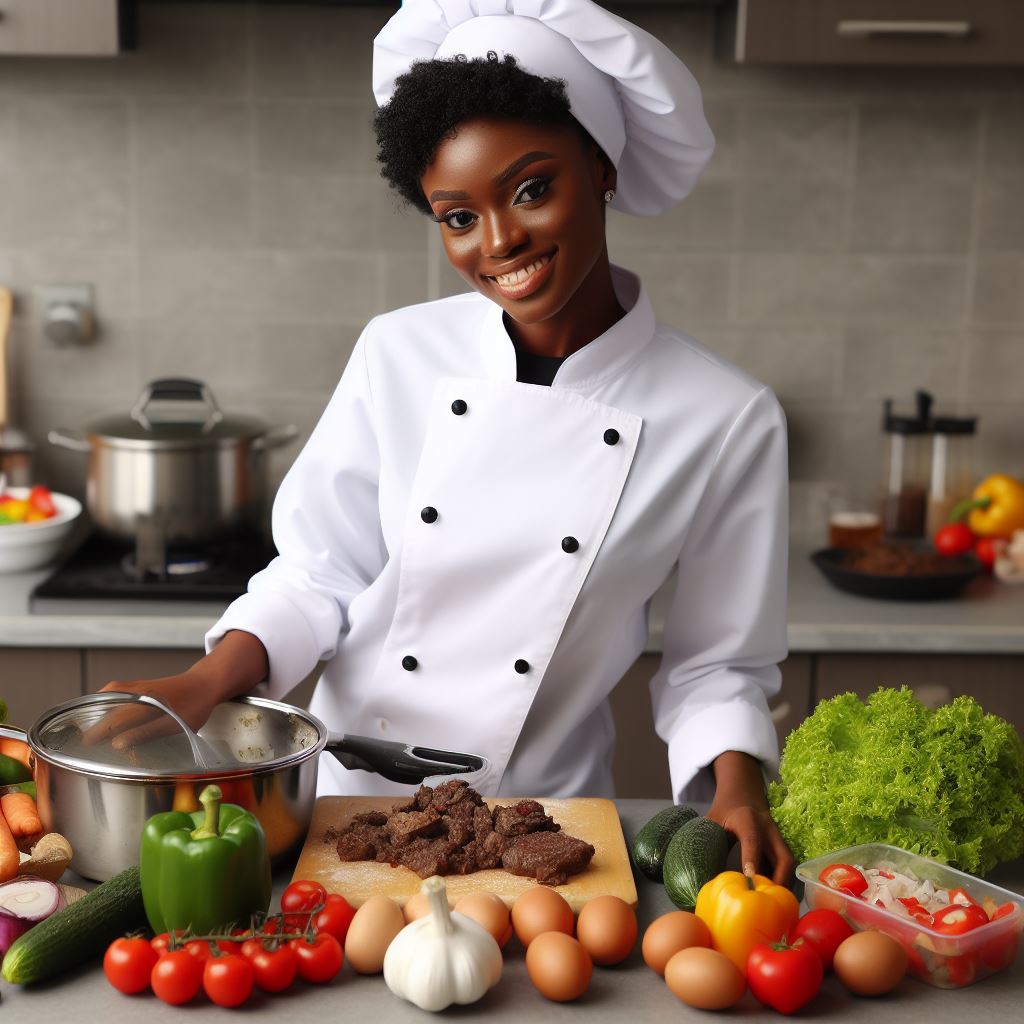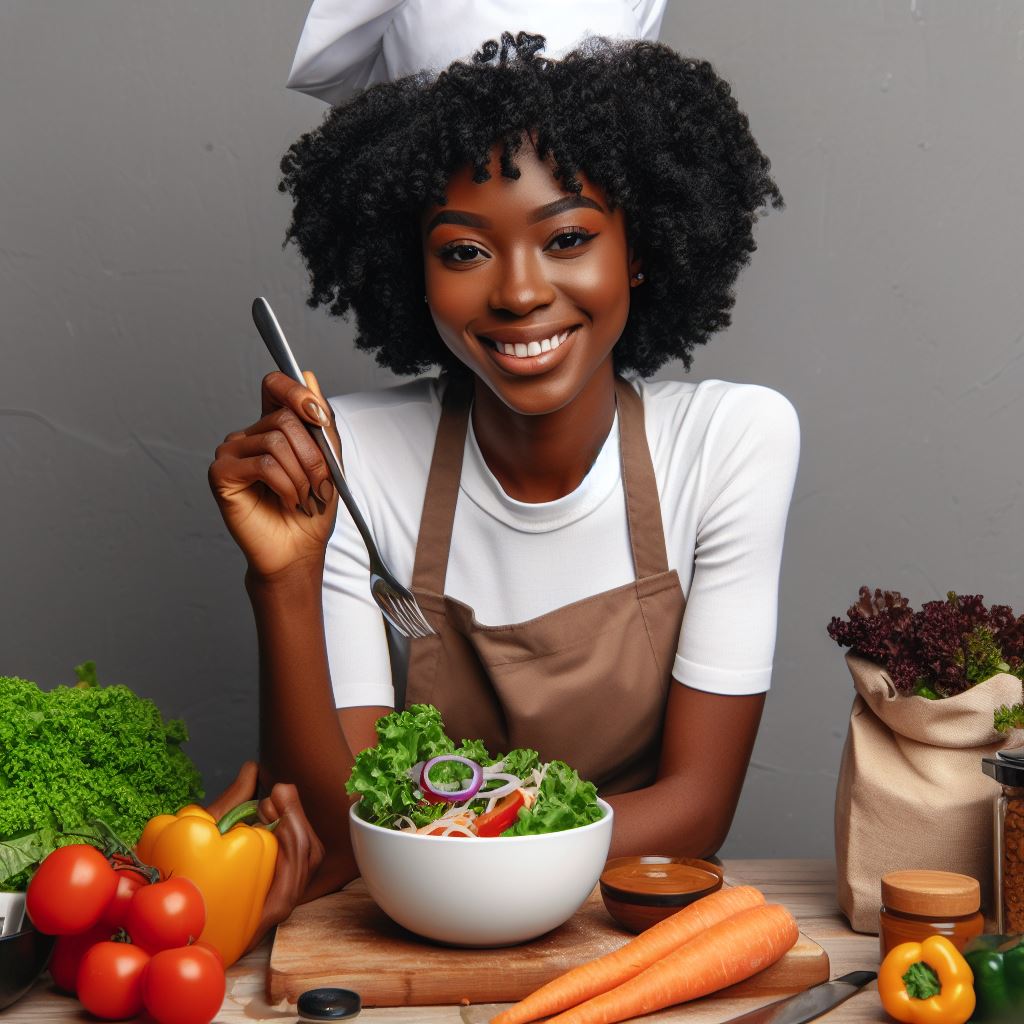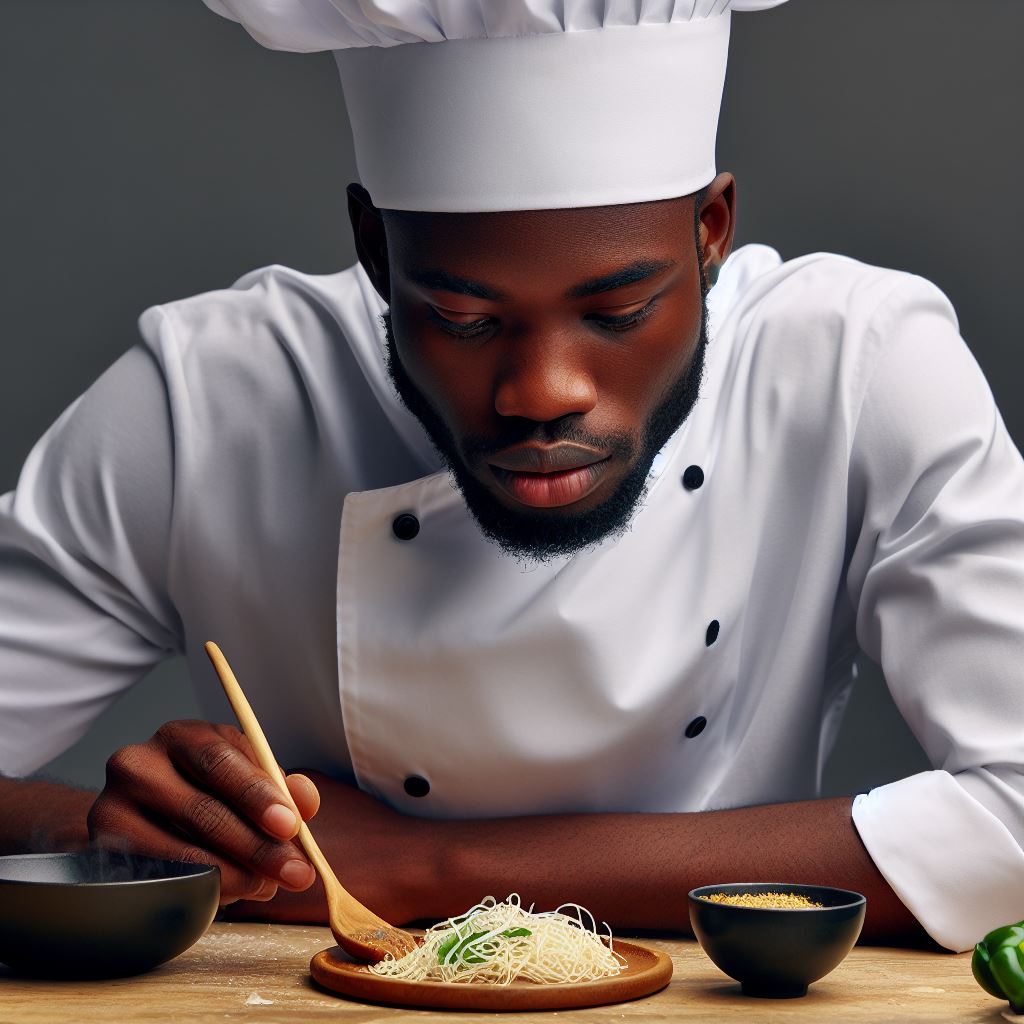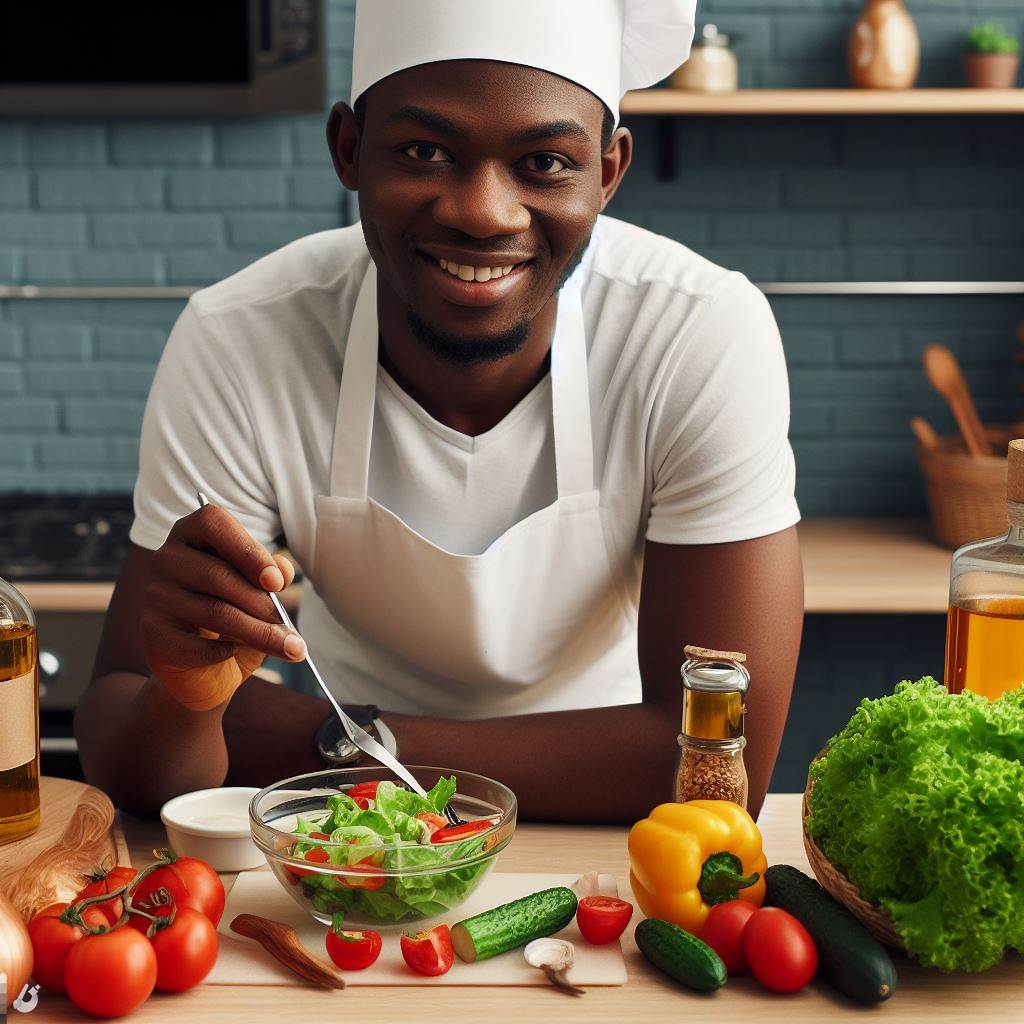Introduction
Iron is essential for maintaining good health, and Nigerian foods are rich in iron.
Anaemia, a common condition caused by iron deficiency, can be fought naturally through iron-rich Nigerian foods.
Iron plays a crucial role in maintaining good health.
It is responsible for producing hemoglobin, a protein that carries oxygen to all body cells.
Without enough iron, the body cannot produce enough red blood cells leading to anemia.
Anaemia is a condition characterized by fatigue, weakness, pale skin, and shortness of breath.
It is a prevalent health issue in Nigeria, affecting both children and adults.
Iron deficiency is a leading cause of anaemia, and it can be combated naturally through diet.
Nigerian foods present a wide range of options to obtain the required iron intake.
Some examples of iron-rich Nigerian foods include beans, spinach, liver, and palm oil.
Beans are not only rich in iron but also a good source of protein and fiber.
Spinach is a leafy green vegetable packed with iron, vitamins, and minerals.
Liver is an excellent source of heme iron, which is easily absorbed by the body.
Palm oil is not only an excellent source of iron but also contains vitamin E and antioxidants.
Including these iron-rich foods in daily meals can help fight anaemia naturally.
Unlock the Power of Nigerian Food Minerals
Discover personalized Food Advisory tailored to boost your health or business using expert insights on Nigerian minerals.
Get StartedIt is important to note that iron absorption can be enhanced by consuming vitamin C-rich foods.
For optimal iron absorption, it is advisable to avoid consuming iron-rich foods with calcium-rich foods simultaneously.
In essence, iron is crucial for good health, and Nigerian foods offer a natural way to fight anaemia.
Understanding Iron
Role of iron in the body
Iron is an essential mineral that plays a vital role in our overall health and well-being.
It is found in every cell of the body and is involved in various important functions.
Without adequate amounts of iron, our bodies cannot function properly.
One of the primary roles of iron in the body is to help transport oxygen throughout the bloodstream.
Iron is a key component of hemoglobin, the protein in red blood cells that carries oxygen from the lungs to the rest of the body.
This oxygen is then used by our cells to produce energy.
Without sufficient iron, our cells and tissues would not receive the oxygen they need to function efficiently.
Consuming enough iron-rich foods is crucial for maintaining optimal health.
When we don’t get enough iron, it can lead to a condition called iron deficiency anemia.
This occurs when the body’s iron stores become depleted, resulting in a decrease in red blood cell production.
Symptoms of anemia include fatigue, weakness, shortness of breath, pale skin, and difficulty concentrating.
Captivate Your Audience with Exclusive Nigerian Food Content
Imagine your platform enriched with unique, mineral-rich Nigerian cuisine stories that no one else can offer. Let's create content that resonates deeply and sets you apart.
Get StartedImportance of consuming enough iron-rich foods
It’s important to consume iron-rich foods regularly to prevent iron deficiency and its associated symptoms.
Some excellent sources of dietary iron include red meat, poultry, fish, legumes, tofu, spinach, kale, and fortified cereals.
By incorporating these foods into our diet, we can ensure that we are getting enough iron to support our body’s needs.
Recommended daily intake of iron for different age groups
The recommended daily intake of iron varies depending on age and gender.
For adult men and postmenopausal women, the recommended daily intake is 8 milligrams.
On the other hand, premenopausal women need a higher intake of 18 milligrams per day to compensate for their monthly menstrual blood loss.
Infants, children, and teenagers have different iron requirements based on their growth and development.
Infants aged 7-12 months need 11 milligrams of iron per day, while children aged 1-3 years require 7 milligrams.
Children aged 4-8 years should aim for 10 milligrams, and those aged 9-13 years need 8 milligrams.
During adolescence, the recommended daily intake increases again, with boys aged 14-18 years needing 11 milligrams and girls aged 14-18 years requiring 15 milligrams.
Pregnant women have higher iron needs to support the growth and development of the fetus.
They should aim for 27 milligrams of iron per day. However, it’s important to note that iron absorption from plant-based sources is lower than from meat-based sources.
Therefore, vegetarians and vegans may need to consume slightly higher amounts of iron to meet their body’s needs.
In essence, iron plays a crucial role in our bodies, primarily in oxygen transport, and not consuming enough iron-rich foods can lead to iron deficiency anemia.
It’s essential to meet the recommended daily intake of iron for your age and gender to maintain optimal health.
Incorporating iron-rich foods into your diet is a natural way to fight anemia and support your overall well-being.
Read: Top Nigerian Foods Rich in Calcium for Bone Health
Common Iron-rich Nigerian Foods
Various traditional Nigerian foods that are rich in iron
Iron is an essential nutrient that plays a vital role in the body.
It is responsible for producing hemoglobin, a protein in red blood cells that helps transport oxygen throughout the body.
Insufficient iron can lead to a condition called anemia, which results in fatigue, weakness, and poor concentration.
While iron supplements are widely available, incorporating iron-rich foods into the diet is a natural and effective way to combat anemia.
In Nigeria, there are several traditional foods that are rich in iron and can help fight anemia naturally.
Examples like dark leafy greens
- Dark Leafy Greens: Nigerian cuisine offers a variety of dark leafy greens that are packed with iron.
Vegetables such as spinach, ugwu (pumpkin leaves), and efo tete (African spinach) are excellent sources of iron. These greens can be incorporated into soups, stews, or stir-fried dishes. - Beans and Lentils: Legumes are a staple in Nigerian cuisine and are known for their high iron content.
Foods like black-eyed peas (cowpeas), soybeans, and lentils are rich in iron. They can be used in various dishes, including soups, stews, and porridge. - Organ Meats: Organ meats, such as liver, heart, and kidney, are commonly consumed in Nigeria.
These meats are not only flavorful but also highly nutritious, especially when it comes to iron. Including organ meats in your diet can significantly boost your iron levels. - Fortified Cereals: Fortified cereals are a convenient option for increasing iron intake. Many Nigerian breakfast cereals, such as cornflakes and oats, are fortified with iron and other essential nutrients.
Enjoying a bowl of fortified cereal in the morning can be an easy way to incorporate more iron into your diet.
Nutritional value and iron content of each food item
Now let’s delve into the nutritional value and iron content of these iron-rich Nigerian foods:
Dark Leafy Greens
- Spinach: It is loaded with iron, providing approximately 3.2 mg of iron per cooked cup.
- Ugwu (Pumpkin leaves): It contains about 3.8 mg of iron per cooked cup.
- Efo Tete (African Spinach): This green leafy vegetable offers around 6.4 mg of iron per cooked cup.
Beans and Lentils
- Black-eyed Peas (Cowpeas): These legumes contain approximately 4.3 mg of iron per cooked cup.
- Soybeans: Rich in iron, soybeans provide around 8.8 mg of iron per cooked cup.
- Lentils: They are a great source of iron, offering approximately 6.6 mg of iron per cooked cup.
Organ Meats
- Liver: Liver is exceptionally high in iron, providing approximately 5.2 mg of iron per 3-ounce serving.
- Heart: This organ meat contains around 4.4 mg of iron per 3-ounce serving.
- Kidney: Kidney meat offers about 4.9 mg of iron per 3-ounce serving.
Fortified Cereals
- Cornflakes: A typical serving of cornflakes can contain up to 18 mg of iron.
- Oats: Oats are fortified with iron and can provide around 4.6 mg of iron per cooked cup.
Incorporating these iron-rich Nigerian foods into your diet can help fight anemia naturally.
However, it’s crucial to note that iron absorption is enhanced when consumed alongside foods rich in vitamin C.
Including fruits like oranges, tomatoes, and bell peppers can significantly increase the iron absorption from these foods.
Remember, if you suspect you have an iron deficiency or anemia, it’s important to consult with a healthcare professional for proper diagnosis and treatment.
Read: Mineral Water vs. Tap Water: What’s Best for Nigerians?

The Impact of Iron Deficiency
Iron deficiency is a common nutritional problem that affects a significant portion of the population worldwide.
Symptoms and Health Consequences of Iron Deficiency
Iron deficiency can lead to various symptoms such as fatigue, weakness, and shortness of breath.
Severe cases can cause pale skin, chest pain, and heart palpitations.
It can also affect the immune system, making people more prone to infections.
How Anaemia Affects Energy Levels, Cognitive Function, and Overall Well-Being
Anaemia, often caused by iron deficiency, can significantly impact energy levels.
Without enough iron, the body struggles to produce adequate amounts of hemoglobin, which carries oxygen to the cells.
This can result in fatigue, decreased productivity, and reduced overall well-being.
Furthermore, iron deficiency can impair cognitive function, affecting concentration, memory, and overall brain performance.
Risk Groups for Iron Deficiency
Certain population groups are at higher risk of iron deficiency.
Pregnant women require increased iron intake to support the growth of the fetus and prevent complications.
Children, especially those in developmental stages, also require sufficient iron for optimal growth and cognitive development.
Vegetarians and vegans may struggle with iron deficiency since plant-based sources of iron are not as easily absorbed by the body.
Iron-rich foods are crucial in fighting and preventing iron deficiency and anaemia naturally.
By incorporating these foods into our diets, we can improve energy levels, brain function, and overall well-being.
Examples of iron-rich foods that can help combat iron deficiency
Here are some examples of iron-rich foods that can help combat iron deficiency:
- Red Meat: Red meat, such as beef and lamb, is an excellent source of highly absorbable heme iron. Consuming moderate amounts can significantly contribute to increasing iron levels in the body.
- Poultry: Chicken and turkey are lean sources of iron. Including them in meals not only adds flavor but also enhances iron intake.
- Seafood: Seafood like clams, mussels, and oysters are rich in iron and other essential nutrients. They can be a delicious and nutritious addition to any diet.
- Legumes: Beans, lentils, and chickpeas are plant-based sources of iron. They are also high in fiber, protein, and other important vitamins and minerals.
- Leafy Green Vegetables: Spinach, kale, and broccoli are great sources of iron. They are also packed with antioxidants and other beneficial compounds.
- Nuts and Seeds: Including almonds, cashews, and pumpkin seeds in your diet can provide not only iron but also healthy fats and other vital nutrients.
- Fortified Foods: Some foods, such as cereals, bread, and pasta, are fortified with iron. These can be convenient options for increasing iron intake, especially for those with dietary restrictions.
In addition to incorporating iron-rich foods into our diets, it is essential to enhance iron absorption by consuming vitamin C-rich foods alongside iron sources.
Vitamin C helps the body absorb iron more efficiently. Citrus fruits, bell peppers, and tomatoes are excellent sources of vitamin C.
Iron deficiency and anaemia can have significant health implications, affecting energy levels, cognition, and overall well-being.
By understanding the symptoms, consequences, and risk groups, we can take proactive steps to combat iron deficiency and improve our health naturally.
Including a variety of iron-rich foods in our diets and optimizing iron absorption can go a long way in preventing and addressing iron deficiency effectively.
Read: Why Every Nigerian Should Eat Mineral-Rich Foods Daily
Tips for Increasing Iron Intake Naturally
Iron deficiency is a prevailing concern in Nigeria, but combatting it can be simple by incorporating iron-rich foods into your daily diet.
Here are practical suggestions and tips to naturally boost your iron intake:
Incorporating Iron-Rich Foods into Daily Meals
- Leafy Greens: Include spinach, ugwu, and bitter leaf in stews, soups, or smoothies for a significant iron boost.
- Legumes and Beans: Consume beans, lentils, and soy products like tofu regularly as they’re packed with iron.
- Red Meat and Organ Meats: Integrate lean beef, liver, and kidney into your meals for a substantial iron source.
- Seeds and Nuts: Snack on pumpkin seeds, cashews, and almonds, or sprinkle them on salads and cereals.
- Fortified Foods: Choose iron-fortified cereals, bread, and pasta to augment your daily iron intake.
Cooking and Preparation Tips to Enhance Iron Absorption
- Pair Iron-Rich Foods with Vitamin C: Combine iron sources with citrus fruits, tomatoes, or peppers to improve iron absorption.
- Avoid Overcooking: Cook vegetables lightly to retain their iron content; overcooking can deplete nutrients.
- Cast Iron Cookware: Utilize cast iron pans for cooking as they can infuse small amounts of iron into your food.
- Sprouting and Soaking: Soak grains and legumes overnight to reduce phytates, enhancing iron absorption.
Importance of Consuming Vitamin C-rich Foods Alongside Iron-rich Foods
- Enhanced Absorption: Vitamin C aids in iron absorption, making it crucial to include alongside iron-rich meals.
- Fruits and Vegetables: Incorporate citrus fruits, strawberries, bell peppers, and broccoli into your diet regularly.
- Balanced Meals: Create balanced meals by pairing iron-rich foods with vitamin C sources for optimal absorption.
By incorporating these simple yet effective tips into your diet, you can naturally increase your iron intake, combatting anaemia and promoting overall health and vitality.
Read: From Farm to Plate: Tracking Minerals in Nigerian Crops
Find Out More: Exploring Salt: Sodium’s Role in Traditional Dishes
Other Factors Affecting Iron Absorption
Factors that can hinder iron absorption
- Consumption of certain beverages, such as tea and coffee, can hinder iron absorption.
- Phytates and polyphenols found in some plant-based foods can inhibit iron absorption.
- Calcium-rich foods, especially when consumed in large quantities, can interfere with iron absorption.
- Consuming excessive amounts of fiber can reduce the absorption of non-heme iron.
The significance of food pairing and timing for maximizing iron absorption
- Combining vitamin C-rich foods (like citrus fruits) with iron-rich foods enhances iron absorption.
- Meat, fish, or poultry paired with plant-based iron sources increases the absorption of non-heme iron.
- Consuming iron-rich foods separately from calcium-rich foods can enhance iron absorption.
- Taking iron supplements with vitamin C or on an empty stomach can improve absorption.
Overcoming obstacles to iron absorption
- Limit the consumption of beverages that hinder iron absorption, especially during meals.
- Soak and cook high-phytate foods like beans and legumes to reduce the inhibitory effects.
- Try to consume iron-rich foods separately from calcium-rich foods to maximize absorption.
- Increase the intake of vitamin C-rich foods like bell peppers, strawberries, and broccoli.
- Consider taking iron supplements with a source of vitamin C to enhance absorption.
- Spread out iron intake throughout the day to maximize absorption instead of consuming large amounts at once.
- Seek medical advice if iron deficiency persists, as an underlying health condition may be hindering absorption.
By understanding the factors that impact iron absorption and making conscious dietary choices, you can naturally fight anaemia and maintain optimal iron levels.
Conclusion
Iron plays a vital role in fighting anaemia naturally. It is essential to consume iron-rich Nigerian foods to ensure an adequate intake of this important mineral.
These foods include spinach, beans, red meat, and palm oil. By making conscious dietary choices, individuals can boost their iron levels and prevent anaemia.
So, let’s prioritize our health and incorporate these iron-rich foods into our daily meals for a stronger and healthier body.
Remember, prevention is always better than cure!




